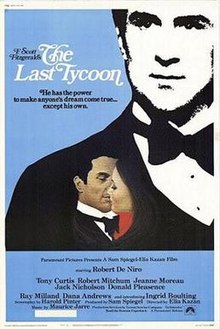The Last Tycoon (1976 film)
| The Last Tycoon | |
|---|---|
 Theatrical release poster by Richard Amsel | |
| Directed by | Elia Kazan |
| Screenplay by | Harold Pinter |
| Based on | The Last Tycoon by F. Scott Fitzgerald |
| Produced by | Sam Spiegel |
| Starring | |
| Cinematography | Victor J. Kemper |
| Edited by | Richard Marks |
| Music by | Maurice Jarre |
Production companies |
|
| Distributed by | Paramount Pictures |
Release date |
|
Running time | 123 minutes |
| Country | United States |
| Language | English |
| Budget | $5.5 million[1] |
| Box office | $1.8 million[1] |
The Last Tycoon is a 1976 American period romantic drama film directed by Elia Kazan and produced by Sam Spiegel, based upon Harold Pinter's screenplay adaptation of F. Scott Fitzgerald's unfinished novel The Last Tycoon. It stars Robert De Niro, Tony Curtis, Robert Mitchum, Jack Nicholson, Donald Pleasence, Jeanne Moreau, Theresa Russell and Ingrid Boulting.
The film was the second collaboration between Kazan and Spiegel, who worked closely together to make On the Waterfront. Fitzgerald based the novel's protagonist, Monroe Stahr, on film producer Irving Thalberg. Spiegel was once awarded the Irving G. Thalberg Memorial Award.
The Last Tycoon did not receive the critical acclaim that much of Kazan's earlier work received, considering the level of talent involved, but it was nominated for an Academy Award for Best Art Direction (Gene Callahan, Jack T. Collis, and Jerry Wunderlich).
The story itself was Fitzgerald's last, unfinished novel, as well as the last film Kazan directed, even though he lived until 2003.
Plot
Monroe Stahr is the young production chief and the most creative executive of one of the biggest studios of the Golden Age of Hollywood. He is a tireless worker in a time of turmoil in the industry due to the creation of the Writers Guild of America; Monroe is accustomed to making his underlings, including screenwriters, do whatever he says.
Monroe's life flows between film shootings, industry bosses' machinations, discussions with writers and actors and a battle with a union organizer named Brimmer, whose intrusion he resents. In the meantime, Monroe becomes obsessed with a young woman with a troubled past, Kathleen Moore, who is engaged to be married to another man. Cecilia Brady, the young daughter of a studio board member, tries in vain to make Monroe see how she truly feels about him.
Pat Brady and other studio executives resent Monroe's neglect and disrespect for their wishes. Seeing his treatment of the union organizer as the last straw, they insist that Monroe go away for a long rest. As his difficulties grow bigger and his health declines, Monroe's life runs to an uncertain but inevitable twilight that echoes a long gone era.
Cast
- Robert De Niro as Monroe Stahr
- Tony Curtis as Rodriguez
- Robert Mitchum as Pat Brady
- Jeanne Moreau as Didi
- Jack Nicholson as Brimmer
- Donald Pleasence as George Boxley
- Ray Milland as Fleishacker
- Dana Andrews as Red Ridingwood
- Ingrid Boulting as Kathleen Moore
- Peter Strauss as Wylie White
- Theresa Russell as Cecilia Brady
- Tige Andrews as Popolos
- Morgan Farley as Marcus
- John Carradine as Tour guide
- Jeff Corey as Doctor
- Diane Shalet as Stahr's secretary
- Seymour Cassel as Seal trainer
- Anjelica Huston as Edna
Themes
The character Monroe Stahr is full of associations to Irving Thalberg, the production chief at M-G-M in the period between the late 1920s and 1930s. The background is Hollywood in the Golden Thirties, when studios made 30 to 40 productions a year and every backlot could simultaneously sustain motion pictures being set in multiple locations around the world such as New York City, Africa, the South Pole and Montmartre. The background of the film has a close bond to stories of Hollywood at that time, as well as to Fitzgerald's own life and career.
The theme of unfinished ambitions and the unattained love of the young and beautiful in Hollywood, embodied by the beach house, have great significance for both the Novelist and Director at the end of their luminary careers.[citation needed]
Vincent Canby of The New York Times writes:
None of the changes that Mr. Pinter has made in the novel seem to me to damage the style or mood of the book. More than any other screen adaptation of a Fitzgerald work—with the exception of Joan Micklin Silver's fine adaptation of the short story Bernice Bobs Her Hair—The Last Tycoon preserves original feeling and intelligence. The movie is full of echoes. We watch it as if at a far remove from what's happening, but that too is appropriate: Fitzgerald was writing history as it happened.[2]
Reception
This section needs expansion. You can help by adding to it. (July 2024) |
Retrospective critical perception of The Last Tycoon has been tepid. Having evaluated 27 reviews published between 2000 and 2024, Review aggregator Rotten Tomatoes shows a rating of 33%.[3]
References
- ^ a b Nat Segaloff, Final Cuts: The Last Films of 50 Great Directors, Bear Manor Media 2013 p 146-148
- ^ Canby, Vincent (November 18, 1976). "'Tycoon' Echoes 30's Hollywood". The New York Times.
- ^ "The Last Tycoon". Rotten Tomatoes.
